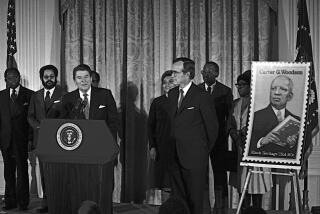Where Does Black Fit In With Red, White, Blue?
- Share via
It lasts a mere flicker of a moment, this scene in “The General’s Daughter” in which John Travolta’s character is trying to run off a meddlesome small-town Southern sheriff with sarcasm and a few pointed insults.
His voice dripping with disdain, Travolta’s character says something like, “Shouldn’t you be off somewhere rousting coloreds?”
It got the biggest laugh of the evening from the virtually all-white crowd watching with me.
I sat stone-faced, and as the laughter died down and I shifted in my seat, I caught the eye of a black man seated a few rows above me. In his face I saw the same combination of emotions--hurt, disgust, resignation--that I felt welling up in me.
*
I thought about that moment a lot this week, as we geared up for our nation’s birthday, the celebration of a Declaration of Independence that did not extend its freedoms to people like me.
What does it mean that my white brethren still find humor in the image of black folks being harassed by police? Are they comfortable laughing because they were not at the end of the lash, or does our pain just seem like ancient history?
And what does it say about my tangled relations with this country that I burn with humiliation in the face of their laughter, reminded once again of how long, how shamefully, this nation I love has rejected people who look like me.
Maybe fire hoses and police dogs, bullwhips and jail cells seem like relics of another civilization to some. But not to me.
I am the daughter of a man whose family fled Georgia with a lynch mob on its heels, and a mother born and raised in Alabama who had to swallow her pride and explain to her young Ohio-bred daughters why we couldn’t use the department store restroom on a visit to her hometown, because it was for “white ladies only.”
The reality is our painful history continues to reverberate in the present, in our memories and the lives we lead . . . lives too often on the periphery of all America has promised.
And while I celebrate today, I cannot forget that those grand pronouncements of freedom in the Declaration of Independence had nothing to do with me, that I am a descendant of people who would labor enslaved for almost another 100 years before they would be, grudgingly, declared free.
As former slave-turned-abolitionist Frederick Douglass said in his historic 1852 Fourth of July speech:
“I am not included within the pale of this glorious anniversary. Your high independence only reveals the immeasurable distance between us. . . . The rich inheritance of justice, liberty, prosperity and independence bequeathed to your fathers is shared by you, not by me. . . . This Fourth of July is yours, not mine.”
Throughout the years, that ambivalence has persisted among blacks as we’ve watched this country lurch forward toward inclusion but never quite embrace full equality.
To be sure, by almost any measure, now is the best time to be black in America. The black middle class is thriving, with employment and homeownership high. More blacks are in college, fewer are on welfare or mired in poverty.
But discrimination is still pervasive and deep, and our children’s future is still in jeopardy. Blacks lag behind whites in almost every measure--from education to income, health care to longevity.
And no matter how well we live, the reality of our history denies us the innocence of full partnership in an America built on ideals in which we want so desperately to believe.
*
We were making our way home, through our suburban streets, when we spotted the holiday decorations. Stuck in every front lawn --courtesy of a local real estate agent--were tiny waving Stars and Stripes.
“Look at the all the flags,” said my daughter, mesmerized by the unbroken line of red, white and blue, fluttering in the breeze. “They’re so pretty!”
I bit my tongue. They were a pretty sight, but they didn’t move me, because I can’t yet vouch for the beauty their promise should mean.
But I hope my children see it differently. They are growing up with all the trappings of middle-class life, with luxuries I could only dream of as a child.
Yet, if statistics hold true, they will do worse in class than their white classmates, earn less than their white co-workers. They are more likely to get pregnant, to be murdered, to fall in love with a man who winds up in jail.
Their innocence reflects their standing in life, as well as their youth. They can see only the brightness, the dreams.
How hostile, I wonder, will the world they inherit from us be? Will they grow disillusioned, weary of the little indignities? Or will their generation transcend this country’s racist legacy? Will there ever come a time they can sit in a theater and feel detached enough from it all to laugh at the specter of a Southern sheriff bullying people who look like them, like me?
And I only hope that when my children are grown, they will look at those flags and still find them pretty--when they understand what the Stars and Stripes mean.
Sandy Banks can be reached by e-mail at sandy.banks@latimes.com.
More to Read
Only good movies
Get the Indie Focus newsletter, Mark Olsen's weekly guide to the world of cinema.
You may occasionally receive promotional content from the Los Angeles Times.








